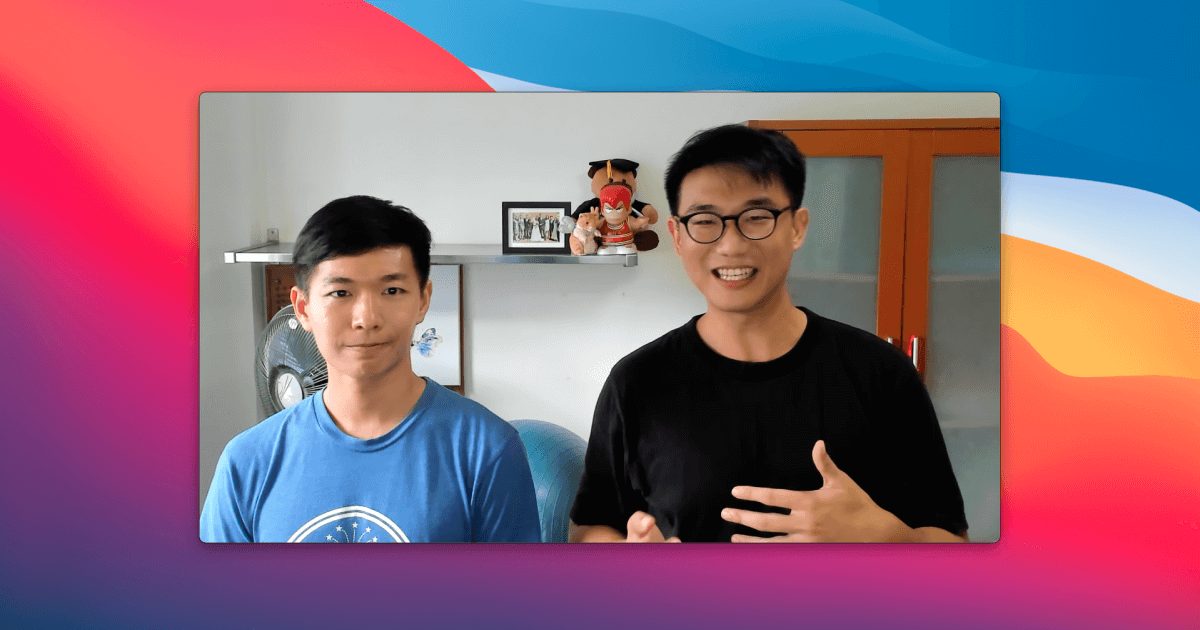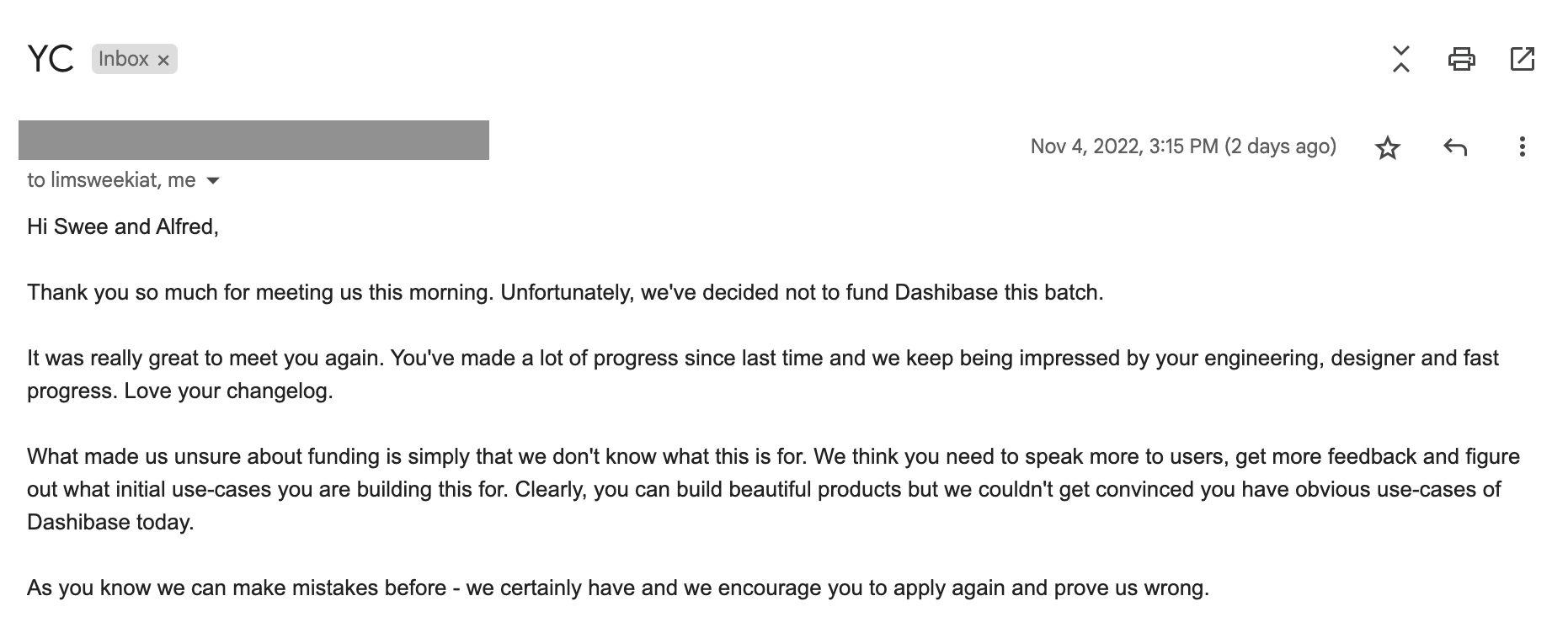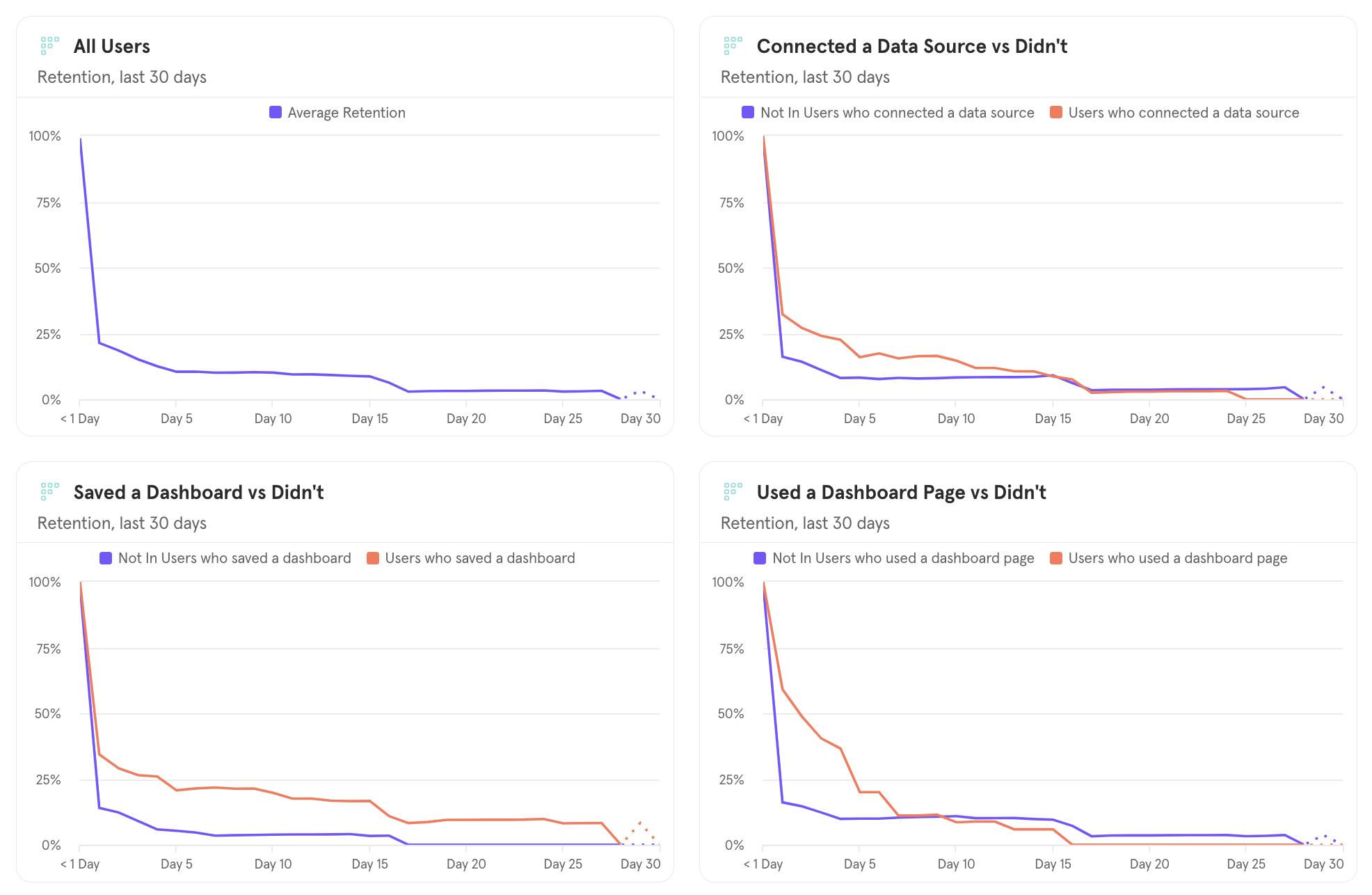Company/November 7, 2022
Our (Second) Short Y Combinator Experience

Alfred Lua
Co-founder

We had our YC interview last Thursday night.
Here’s our story and honest advice.
Hold on to your seats because it’s a rollercoaster ride.
Think very clearly about your business
The interview went well. Much better than our previous interview six months ago. In fact, we feel embarrassed thinking about that interview. We hadn’t thought much about the idea then because we pivoted to it just a week before the interview.
But this time, we were much more ready.
For context: We are building Notion for internal tools. Imagine being able to build internal tools as easily as creating a Notion page.
We interviewed 150+ people, came up with this iteration of the product in July, and have been shipping improvements every week. We now have over 800 signups, see 5-10 organic signups every day, and have a Discord of 170 members. Early users have asked to angel invest and asked where to share about Dashibase.
In the most expensive 10 minutes of our lives so far, we were asked the following questions:
- Tell us what you are working on
- Excluding new signups, how many users were active last week?
- How are these active users using your product?
- How are you different from Retool? How are you different from Notion?
- Given that you are so close to Retool, if Retool would offer you $25m to buy you and you don’t have to build anything out, what would you do?
- What is your ground-up calculation of the total market size?
- What are the use cases you are seeing?
- Notion took 3-4 years before it got popular. People take time to adopt new things. What makes you think people will use you?
- There was a question about the competitive market. Something along the lines of how do you know people want this and are willing to pay?
- Would you move to the US?
- How do you split the roles between the two of you?
- Why start a company?
- When did you start building the product? How long did it take?
Because we have thought hard about our business, we could explain ourselves well. And the interviewers seem happy. One of the interviewers even signed up for Dashibase—during the interview. Woah! We might have a shot!
I was very excited and hopeful, to say the least. My co-founder SK was calmer because he tries not to have expectations in general. (Stanford rejected him twice!)
Build something people want. Not just hype.
If you are accepted to YC, you get a call. Otherwise, an email…
We got an email. Yep, YC decided not to fund us for this batch.
They said we have made a lot of progress since our last interview and they are impressed by our engineering, design, and fast progress. But there don’t seem to be obvious use cases for Dashibase today. Why would anyone use Dashibase?

In hindsight, we built something people think they want. But in reality, they don’t know what to use it for.
We built hype. Not something people want.
It’s a bitter pill to swallow. But you would rather learn this early than when the startup fails.
YC’s feedback is something we have already been thinking about internally since we launched our open beta in September. While we have been getting organic signups every day, the retention hasn’t been great. Out of the 800 signups, maybe five to 10 users came back last week. From what we can see, people tried to use Dashibase for a variety of things but rarely come back.

Turn rejection into motivation
As odd as this might sound, we are feeling more motivated than ever.
Founders get rejected by potential customers, hires, and investors all the time. As YC said, successful founders are OK with rejections.
I actually consider the YC interview our first “office hour” with the partners. They have told us what they thought about our business and what we should do. Now, it is up to us to think critically about their feedback and take action.
From our experience so far, we know we can build. We can get people’s attention. We just need to figure out the right problem and idea to deploy our skills on. We are not far away now.
While our YC experience has been short, we are grateful to our YC interviewers for taking the time to chat with us and share their feedback, our family and friends for supporting us and helping us refine our thoughts, and the wonderful people who have tried and spread the word about Dashibase.
Building a startup is supposed to be tough. But all your support—word-of-mouth recommendations, tweets, livestreams, coffees, and more—has made it enjoyable. We will work even harder to make something people want.



Despite two rejections, we will be applying for YC again. Going through the application and interview has forced us to refine our thoughts and explain our business much more clearly. If you are on the fence, we highly recommend you apply!
What’s next for Dashibase
Not getting into YC has not changed our startup plans and ambition. So here’s what we are doing next:
1. Talk to more users
In the past few months, we spoke to 150+ waitlist signups to learn about their challenges and needs and walked them through the product. Despite any excitement they had then, few continued to use the product. Something obviously went wrong there. And we failed to catch it.
Nevertheless, we can’t build a good product by coding all day. We will be speaking to more people to get feedback and learn what initial use cases we are building this for. If you regularly work with admin panels, internal tools, or content management systems, we would love to chat with you. You can reach me at alfred@dashibase.com.
2. Niche down and identify strong use cases
We have built a very flexible product. Too flexible and not sufficient for any one use case. Maybe we have a good solution to a problem but we misidentified the problem so far. There might be specific use cases that Dashibase can serve well. If that’s the case, we should focus on them and build out the product more specifically for those use cases.
We already have a few ideas in mind, such as helping content-heavy businesses that store their content in their own databases and don’t want to build and maintain a CMS themselves. We could leverage our Notion-like editor to make a great typing experience.
Of course, there is a danger of “a solution looking for a problem.” Maybe nobody has a problem where they need such a thing. But given the early interest we have been seeing, we think there is a problem. But we need to narrow down and focus on the most painful part of the problem. It’s not useful to say the problem is “people are unhappy.”
3. Consider potential pivots
Finally, there’s a chance we have identified a good problem but have the wrong solution. In that case, we would need to change what we build. Or even pivot to another space and idea entirely. We are open to that if we have exhausted all our ideas for Dashibase and still find no traction.
Founders need to know when to move on. But we won’t go down without a fight!
If you want to support us or just follow along: